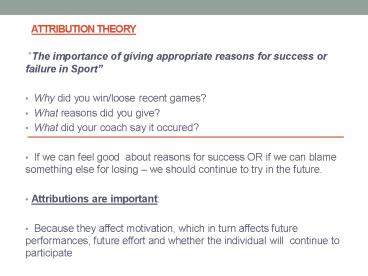Attribution Theory - PowerPoint PPT Presentation
1 / 13
Title:
Attribution Theory
Description:
ATTRIBUTION THEORY The importance of giving appropriate reasons for success or failure in Sport Why did you win/loose recent games? What reasons did you give? – PowerPoint PPT presentation
Number of Views:230
Avg rating:3.0/5.0
Title: Attribution Theory
1
Attribution Theory
- The importance of giving appropriate reasons
for success or failure in Sport - Why did you win/loose recent games?
- What reasons did you give?
- What did your coach say it occured?
- If we can feel good about reasons for success
OR if we can blame something else for losing we
should continue to try in the future. - Attributions are important
- Because they affect motivation, which in turn
affects future performances, future effort and
whether the individual will continue to
participate
2
- Young person told they failed because they do not
have enough ability to suceed unlikely to
try again - If they are told they need to try harder
more likely to continue - Attribution Training
- Attribution theory is important in sport because
it affects future effort - If we think that reasons for success are stable
and we are accountable for them, we will have the
confidence and continue to improve. - If you believe that reasons for failure are
changeable, you can change the future results and
influence the performance
3
Attribution The Theory
- ATTRIBUTION (REASONS) THEORY
- Attribution theory is concerned with the reasons
(attributions) performers give to their success
or failure - Weiner suggested that high achievers and low
achievers attribute success and failure to
different reasons - To become a high achiever the performer must
think like a high achiever they must make
attributions like a high achiever - Weiners 4 Attributions
- Ability
- Effort
- Luck
- Task Difficulty
4
- The 4 attributions can be placed along 2
dimensions - Locus of Causality
- Stability
Locus of Causality Whether the performance
outcome could be caused by factors under the
control of the performer (internal factors of
effort and ability) OR Caused by factors beyond
the control of the performer (external factors of
task difficulty and luck) Copy diagram p.174
5
The Locus of Stability
- Stability
- Whether the performance outcome is fixed and
unchanging OR can vary over time. - Ability and Task difficulty are STABLE and FIXED
during the period of performance. - Effort and luck may change (UNSTABLE) from
performance to performance OR within a
performance - High Achievers attribute success to INTERNAL
factors - failure to EXTERNAL factors
- Low Achievers attribute success to EXTERNAL
factors - failure to STABLE factors
6
SELF SERVING BIAS
- The tendency of performers to attribute success
to themselves - Therefore these will be INTERNAL reasons
- ALSO
- Reasons for failure might be attributed to
external/changeable reasons - EG
- It was the referees fault we lost
- This demonstrates a tendency to protect ones
self esteem
7
Learned Helplessness
- Redefine success where ability is the reason for
failure - Acknowledge the need to change attributions
(attribution retraining) to those appropriate to
high achievers - If the performer is a low achiever, learn how to
attribute success and failure to the same reasons
given by high achievers - Be aware that low achievers often suffer from
Learned Helplessness - L.H is the problem caused by continually
attributing failure to INTERNAL reasons that can
not be changed (Dweck 1978) - Failure is blamed on lack of ability and is out
of your own control because you will never be
able to change the situation
8
Learned Helplessness Cont
- Performers with LH think that
- - Failure is inevitable
- - What they do makes little difference to the
outcome - - Success might be due to luck and not
repeatable - LH can be global or specific
- LH can be based on
- - Lack of success
- - Low confidence
- - A bad experience
- In order to control LH, a change in the
attribution process must take place this is
known as Attribution retraining - Mastery Orientation is the opposite to LH. An
athlete has confidence, they feel in control,
have a history of success
9
Attribution Retraining A reassessment of the
reasons for failure
- We must promote the changeable and external
reasons - The coach might
- change in tactics or blame equipment
- adopt a positive approach
- make the reasons for losing less personal
- avoid citing lack of ability as a reason for
failure - use positive feedback and positive reinforcement
- encourage a change of technique
- attribute success internally (effort/ability)
and failure externally (luck/task difficulty)
10
- ATTRIBUTION THEORY AND ACHIEVEMENT MOTIVATION
- What can it be used for?
- A coach should try to make the performer
- Attribute success to internal factors in order to
maximize confidence and satisfaction - Attribute success to stable factors in order to
maximize the expectation of future success - Attribute failure to external factors in order to
minimize negative feelings - Attribute failure to unstable factors in order to
minimize the expectations of future losses. Be
careful when attributing failure to lack of
effort if the performer has tried their hardest.
11
Attribution Theory and Achievement Motivation
- ATTRIBUTION The Main Points
- Individuals often make INTERNAL attributions for
success and EXTERNAL attributions for failure - As performers we like to feel responsible for
success but that failure was due to factors
beyond our control - Stability is usually related to future
expectations. If we attribute success or failure
to stable factors next time we compete we will
expect the same result. - High and low achievers attribute success and
failure to different factors
12
January 2008
13
Jan 08































